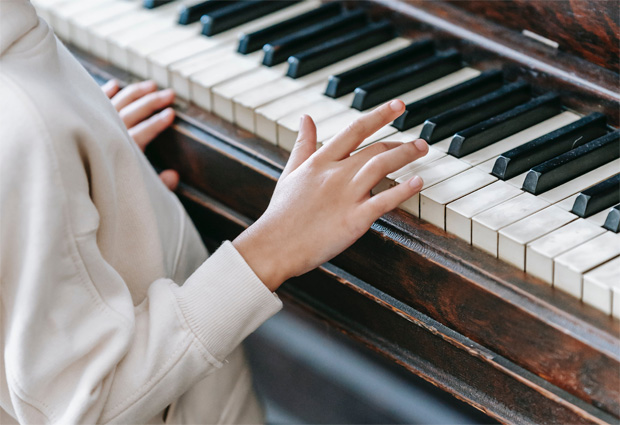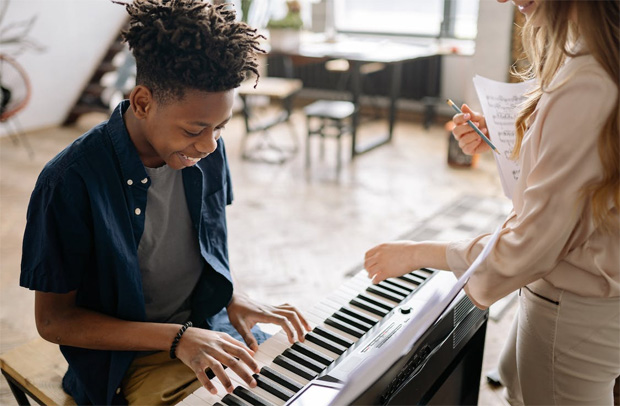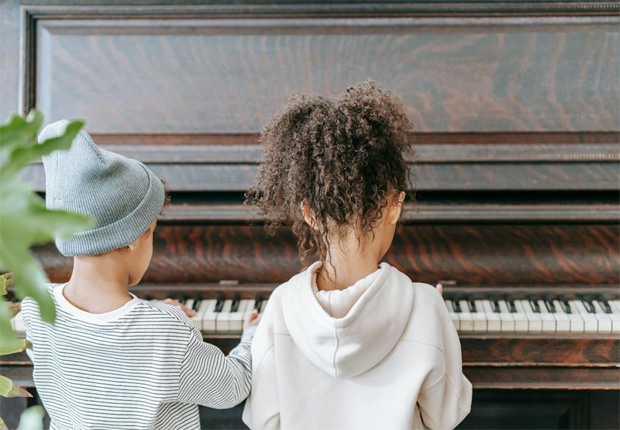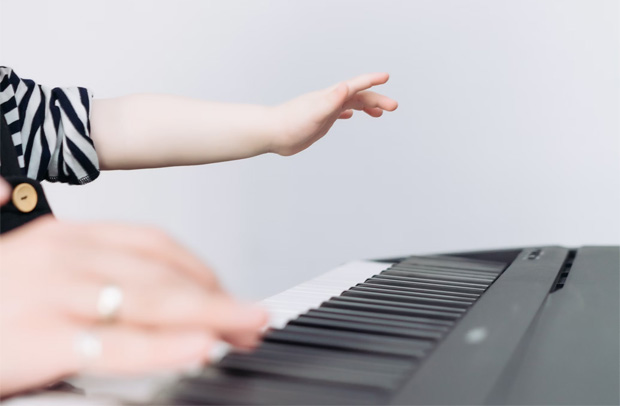Keys to Success: How Piano Learning Boosts Child Development

Keys to Success: How Piano Learning Boosts Child Development
In contemplating which instrument your child should learn, the piano emerges as a highly beneficial choice. This majestic instrument, known for its versatility and rich history, plays a major role in improving various aspects of child development, from cognitive growth to fine motor skills. As we look into the world of piano learning, we uncover the many ways in which this classical instrument can foster not only a child’s musical proficiency but also their overall development, equipping them with skills that benefit them outside of music.

Embracing Modern Methods: Digital Pianos and Online Learning
When it comes to child music education, the advent of digital pianos and online learning has marked a transformative era, offering unprecedented accessibility and versatility in teaching methods.
- The Advantages of Digital Pianos
In today’s fast-paced world, digital pianos have revolutionised the way children learn music. Unlike traditional acoustic pianos, digital pianos offer a range of benefits tailored for young learners. They are generally more affordable, require less space, and need minimal maintenance. Moreover, digital pianos come equipped with volume control and headphone jacks, making them ideal for households where noise can be an issue. The incorporation of various sound options and built-in learning tools further enhances the learning experience, allowing children to explore and create a diverse range of music.
- Online Piano Lessons: A New Era of Musical Education
The advent of online piano lessons has been a game-changer in music education. These lessons provide flexibility and convenience, making it possible for children to learn from the comfort of their own home. Online platforms offer a wide array of resources, including video tutorials, interactive games, and personalised feedback from experienced instructors. This method of learning is particularly beneficial for families with busy schedules or those living in areas with limited access to traditional music education.

Holistic Development Through Piano Learning
Piano learning offers a holistic approach to child development, mixing cognitive enhancement, emotional growth, and physical coordination in a single activity.
Cognitive Enhancement
When discussing the cognitive benefits of piano learning, it’s essential to understand how this activity stimulates and nurtures the young mind. Learning to play the piano is not merely a musical journey, but an intellectual expedition that enhances various cognitive functions in children.
- Boosting Memory and Concentration
One of the most significant cognitive benefits of playing the piano is the improvement in memory and concentration. Learning and memorising music pieces require the brain to develop new neural connections. These connections are not only useful for remembering music but also enhance the overall memory capacity of the child. Additionally, the focus required to read music, understand rhythm, and coordinate hand movements demands and therefore strengthens a child’s concentration skills.
- Enhancing Language and Mathematical Skills
Playing the piano also positively impacts language and mathematical skills. Reading music involves decoding symbols and understanding their rhythmic and harmonic relationships, which parallels the skills used in mathematics and language. This activity helps in developing pattern recognition, a skill integral to mathematics, and in understanding syntax and structure, crucial for language development.
- Spatial-Temporal Abilities
Spatial-temporal skills, which involve visualising and manipulating objects in a given space over time, are crucial in various academic and daily life tasks. Playing the piano requires children to understand musical structures and patterns, which translates to enhanced spatial-temporal reasoning. This skill is particularly beneficial in subjects like mathematics, science, and engineering.
- Improving IQ and Academic Performance
Research has shown that children who engage in musical training, particularly piano learning, display higher IQ levels and better academic performance than their non-musical peers. The discipline, structured learning, and cognitive exercises involved in piano playing contribute to this enhanced intellectual development.
- Promoting Creativity and Problem-Solving Skills
Piano playing is not just about following notes; it’s also about expression and creativity. As children learn to interpret music and add their own emotions and style, they develop creative thinking skills. Moreover, encountering and overcoming challenges during practice, like mastering a difficult piece, enhances their problem-solving abilities.
- Fine Motor Skills and Coordination
The intricate movements required to play the piano efficiently develop fine motor skills. Children learn to coordinate their hand movements with visual and auditory cues. This coordination is crucial not only for playing the piano but also for other activities that require precise hand-eye coordination.

The journey of learning the piano extends far beyond acquiring musical proficiency; it significantly contributes to the emotional and social development of children. This section delves into how piano learning shapes a child’s emotional intelligence and social skills.
- Fostering Emotional Intelligence
One of the most profound benefits of piano learning is its impact on emotional development. Playing the piano allows children to express complex emotions that they might not yet have the words to describe. It’s a form of emotional release and self-expression that nurtures sensitivity and empathy. The discipline of regular practice also teaches children how to handle frustration and disappointment, thereby enhancing their emotional resilience. As they interpret and convey the emotions embedded in music, they develop a deeper understanding of their own feelings and those of others.
- Boosting Confidence and Self-Esteem
Mastering a piece of music on the piano can be a significant confidence booster for children. Each new song learned and each successful performance, whether it’s in front of family or a larger audience, contributes to a sense of accomplishment. This success builds self-esteem and encourages children to take on new challenges, not just in music but in other areas of their lives as well.
- Cultivating Social Skills
Piano learning is often perceived as a solitary activity, but it also has a strong social component. Children learning the piano have opportunities to participate in recitals, join music clubs, or collaborate with other musicians. These activities help them develop key social skills such as teamwork, communication, and respect for their peers. Sharing their music with others, whether through performances or casual play, also helps children learn the value of community and connectivity.
- Enhancing Communication Skills
Music is a universal language, and learning to play the piano gives children a new mode of communication. They learn to convey ideas and emotions through music, which can be particularly beneficial for children who are shy or have difficulty expressing themselves verbally. The process of learning and performing music also teaches them how to present themselves and interact with an audience, fostering public speaking and presentation skills.
- Emotional Regulation and Stress Relief
Playing the piano can be a therapeutic and calming activity for children. It provides a constructive outlet for stress and anxiety, offering a peaceful retreat from the pressures of everyday life. The focus and concentration required during piano practice can also be meditative, helping children to relax and regulate their emotions.
- Nurturing a Lifelong Love for Music
Nurturing a lifelong love for music begins with the early introduction of instruments like the piano, which not only ignites a child’s musical journey but also benefits their overall developmental experience.

The Role of Parents and Educators
Parents and educators play a vital role in nurturing a child’s interest in piano. Encouragement, patience, and support are key to maintaining their enthusiasm and commitment. Choosing the right digital piano, enrolling them in suitable online piano lessons, and celebrating their musical milestones can significantly impact their learning journey.
Learning the piano offers a comprehensive package of benefits for child development. The use of digital pianos and online piano lessons has made this journey more accessible and adaptable to the needs of today’s families. By embracing these modern approaches, we can unlock a world of cognitive, emotional, and social growth for children, instilling in them not only a skill but a lifelong passion for music. As we foster this musical journey, we contribute to the holistic development of the next generation, equipping them with skills and experiences that will benefit them throughout their lives.
FAQs
We’ve summarised some of the most frequently asked questions regarding how pianos boost child development, which we hope will help with any further queries:
- Does learning the piano instill a better work ethic in children?
Learning and playing the piano requires discipline and hours of practice, which instills a strong work ethic in children. This discipline can be beneficial in their academic studies and future careers.
- How does piano playing impact a child’s time management skills?
Piano learning helps with time management as students need to balance practice sessions with other activities like homework. Managing time becomes crucial when participating in recitals or auditions.
- Are there any physical benefits to playing the piano for children?
Yes, playing the piano improves hand-eye coordination and fine motor skills. The more a child plays, the more refined their motor skills become, aiding in other activities as well.
Guest Article.




